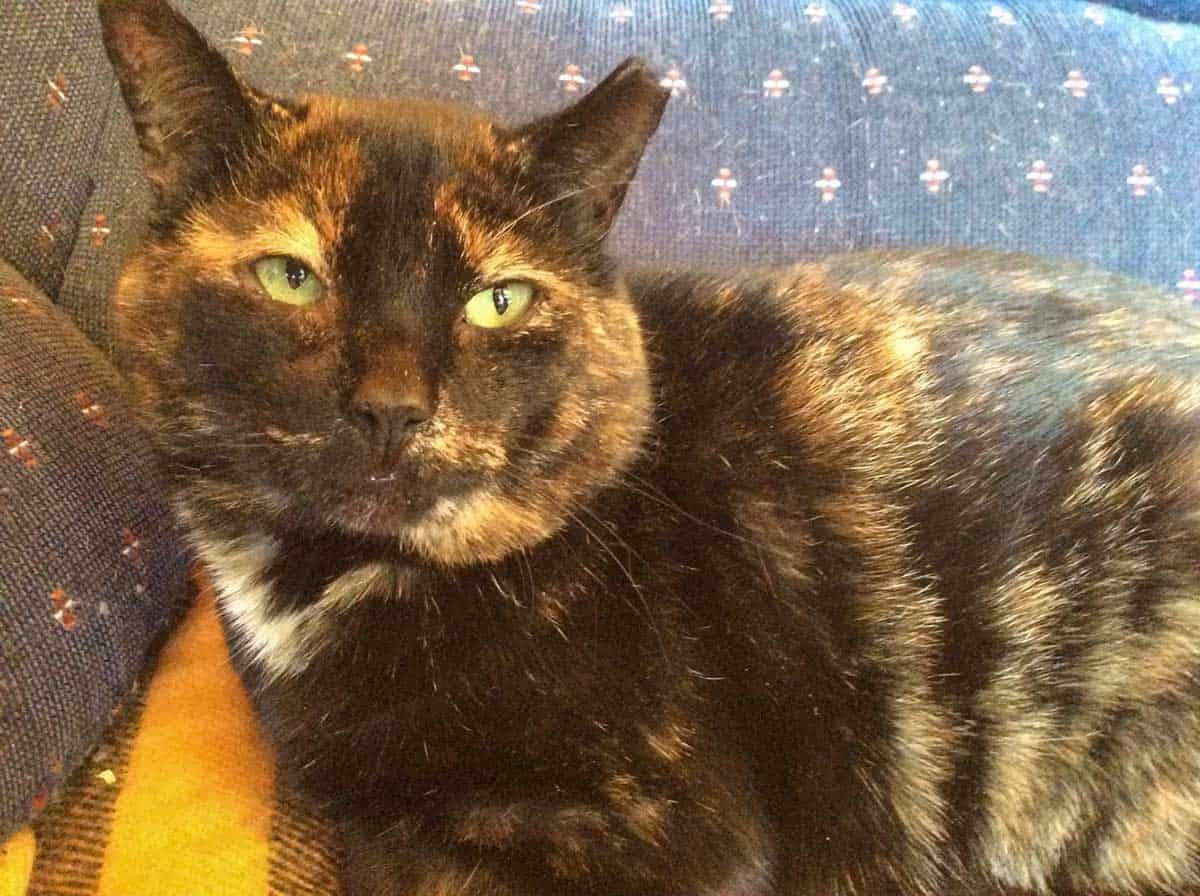MANITOWANING – Two-year-old Anthony is one unique kitty thanks to his rare tortoiseshell colouring, and he is now searching for his fur-ever home after Fixing Our Felines and Pet Save Manitoulin rescued him from spending another winter in the cold.
“He has an extra X chromosome, so only one in every 3,000 (male cat) births are ones like Anthony. If you look online, a kitten like him would sell for between one and two thousand dollars,” said Deb Colville of Pet Save Manitoulin, who is taking care of Anthony for the time being.
Tortoiseshell cats (or ‘torties’) are those that have two colours other than white in their coat, most commonly tan and brown. Anthony sports a bit of white on his tail and a very small white ‘necklace’ which, for some, would classify him as a calico. However, these spots are extremely small and many extend the tortoiseshell distinction to include cats with miniscule white patches.
“(Anthony is) amazing. He has no ‘cattitude’ at all and he hangs out on the couch, goes to the window and watches birds, and is friendly as anything. The only time you hear from him is when he meows for food,” said Ms. Colville. “He’s one of the most perfect cats I’ve seen in all my years.”
Anthony has a troubled past. His rescuers have determined that he began his life with a family, because he was familiar with plates as vessels for human food, but was abandoned at about nine months old.
He was living outside and using Fixing Our Felines’ feeding station through last winter. As this winter approached, that group’s co-founder Colleen Caselton decided to trap the cat. This was especially important because they expected it to be a female, given the colouration, which would mean kittens being born and dying in the winter.
When Fixing Our Felines volunteer Mallory Harasym successfully made the capture on October 27, the team was very surprised to determine that Anthony was, in fact, a male. Anthony, for his part, was dismayed at his captors.
“They called me to tell me they needed to dose him twice to put him to sleep. That is when they noticed he was a male. They were so excited they had heard of such a thing but never seen one,” recalled Ms. Caselton. “He was a living terror when he recovered.”
“He was so vicious that I offered to rehab Anthony through Pet Save Manitoulin,” said Ms. Colville. “He was our second worst cat ever in 18 years.”

Ms. Colville’s son James is an expert cat tamer, said Ms. Caselton, and they felt confident that he was the best person to socialize Anthony.
Torties are known for being much harder to tame than other cats. Ms. Colville spent two months straight rehabilitating his behaviour after his November capture. She explained that their method involves keeping them in a kennel until their behaviour calms down, and then beginning to introduce hand contact while wearing welding gloves.
The gloves serve as a protective barrier. The cats will bite the gloves but they protect the wearer’s hands. When the cat begins to realize that biting doesn’t cause any response, they tend to give up. At that point, they can start socializing more with other cats and more people.
Fixing Our Felines has invested considerably in rehabilitating Anthony. After his year living wild, he had ear and eye infections and needed dentistry work. The costs are pegged at around $1,500 and the group is seeking donations to help ensure Anthony’s future owner won’t have a major cost burden.
The goal is to get the cost down to Fixing Our Felines’ regular adoption fee of $345, which includes all shots and neutering. Anthony is projected to have health issues in the future after his troubled youth, so the groups hope to find an owner with a stable income to support those eventual costs.
He also tested positive for feline immunodeficiency virus, a somewhat rare anti-immune disease that is spread between cats through bites (but not to humans). Because of this, his owner must keep him indoors and cannot have another cat in the home.
In the folklore of many countries, including in Scotland, Ireland, the United States and Japan, torties are considered to bring good fortune to their owners.
“It’s a heck of a deal for someone who wants a cat like Anthony,” Ms. Colville said.
She urged people to contact an agency like Pet Save Manitoulin or Fixing Our Felines if they cannot take care of their pet any more, rather than dumping the pet in the wild. This behaviour is destructive to the physical health and psyche of pets and substantially increases the costs to rehabilitate them, if they can be saved.
In addition, housecats have decimated songbird populations in North America. Estimates peg cats as killing more than 100 million birds in Canada each year.
Anyone wishing to support Anthony’s medical costs can make a donation through Island Animal Hospital. To inquire about giving Anthony a permanent home, contact ColeenCaselton at 705-918-2879 or message ‘Fixing Our Felines Manitowaning’ on Facebook.





